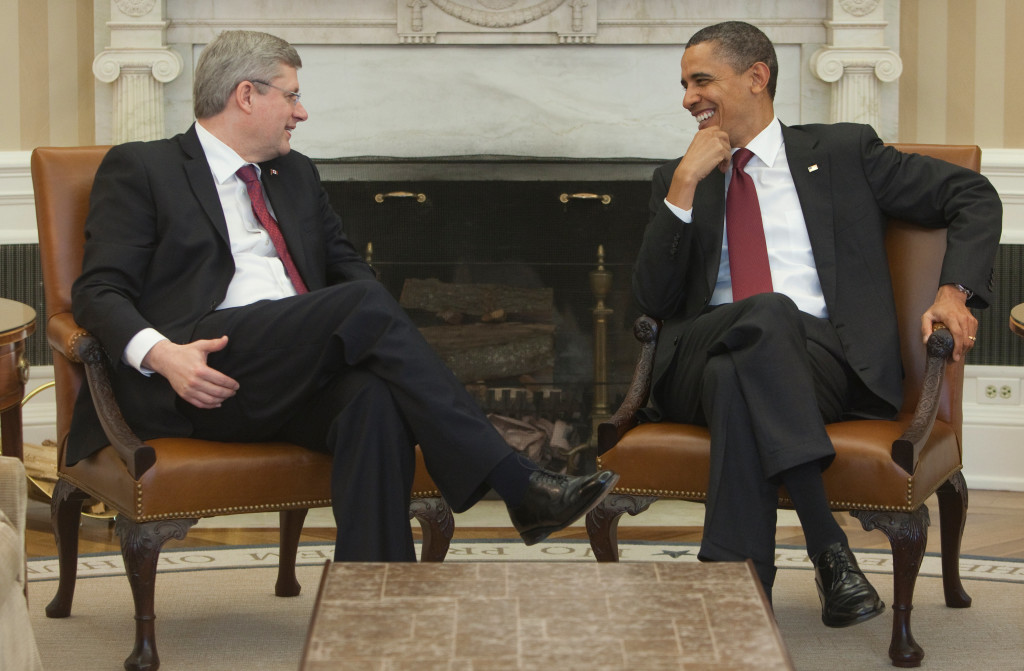
WASHINGTON — A looming veto by President Barack Obama of a Republican-championed bill foreshadows a key question for the White House: whether the president and Republicans can find areas to work together, even as Obama strikes down many of their top priorities.
Since Republicans won full control of Congress three months ago, Obama has issued a flurry of veto threats to Republican bills. Obama hasn’t had to make good on those threats, but now a bill forcing approval of the Keystone XL pipeline is headed to his desk.
Although Obama’s intentions to reject the Keystone bill are well known, the veto nevertheless marks a turning point in Obama’s presidency, as he braces to fend off an onslaught of GOP attempts to reverse actions he has taken.
“This upcoming veto could serve to crystalize the situation on Capitol Hill,” said Jim Manley, a former top adviser to Senate Democratic leader Harry Reid. “Either Republicans are going to have to figure out a way to compromise, or they’re not going to be able to get anything done the next two years.”
That’s critical, Manley and other Democrats said, because Republicans eyeing the 2016 elections need to show they can govern successfully when in power.
The Keystone bill, passed by the House on Wednesday on a 270-152 vote, capped weeks of debate on an infrastructure project that Republicans declared their top priority after they took control of Congress. A group of 24 Republican governors wrote to Obama on Thursday urging him not to veto the bill.
Although it’s been six years since the oil pipeline was proposed, Obama has said the U.S. is still determining whether it’s in the national interest. He vowed to veto any attempts by lawmakers to usurp his authority to make the call.
Republicans, emboldened after having passed a bill they never could get through a Democratic-run Senate, planned a triumphant signing ceremony at the Capitol on Friday. Yet GOP leaders were expected to wait to send the bill to the White House until after lawmakers return from their recess later this month.
That way, when Obama vetoes the bill, Republicans will be on hand to blast the president for nixing a project they say will spur jobs and economic growth.
“The more public attention it gets, the better,” said Sen. John Hoeven, R-N.D., a staunch Keystone supporter.
White House officials haven’t yet decided whether Obama will veto the bill in private and announce it in a simple statement, or whether he’ll do it publicly in grander fashion, a move that would show defiance against Republican attempts to undercut him. During his administration, President Bill Clinton took that approach when he vetoed a tax-cut bill in the Rose Garden, serenaded by a brass band.
“For us, this is not filled with a lot of drama or anticipation because the president’s views on this are well known,” White House press secretary Josh Earnest said in an interview. “We’re mostly interested in not letting these areas of disagreement become obstacles for working together with Congress on other issues” such as trade, tax reform and a war powers resolution.
Republicans too seemed eager not to let their Keystone poison opportunities to cut deals with the president in other areas. They pointed to a bill addressing suicide among veterans – it passed with broad bipartisan support and Obama signed it into law Thursday.
“Republicans are offering dozens of solutions to make a difference for American families and we always welcome the opportunity to work with the president on areas of common ground,” said Cory Fritz, a spokesman for House Speaker John Boehner, R-Ohio.
In his first six years in office, Obama wielded his veto pen only twice – far less often than his predecessors, and both in minor circumstances.
Obama’s veto threats have been piling up rapidly – more than a dozen so far this year, including a new threat Thursday to kill a bill restricting transfers of prisoners out of the U.S. prison at Guantanamo Bay, Cuba. Obama has also said he won’t permit legislation that would roll back his executive actions on immigration, undermine his health care law or gut his environmental protections.
Obama has one factor working in his favor: math. To override his veto, Republicans would have to muster a veto-proof majority of two-thirds in both the House and Senate, which means they’d need some Democratic votes. So far, Republicans haven’t shown they can get to 67 votes in the Senate.